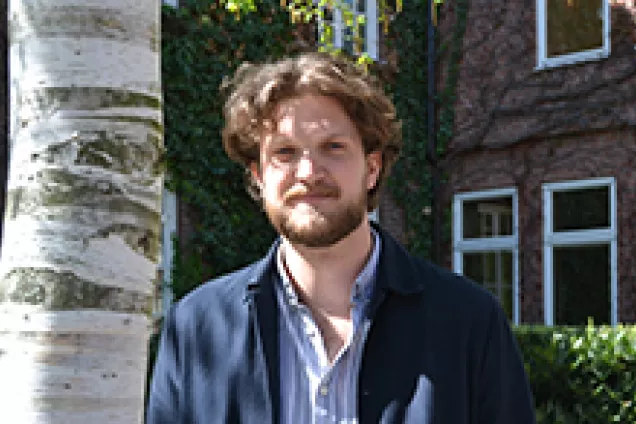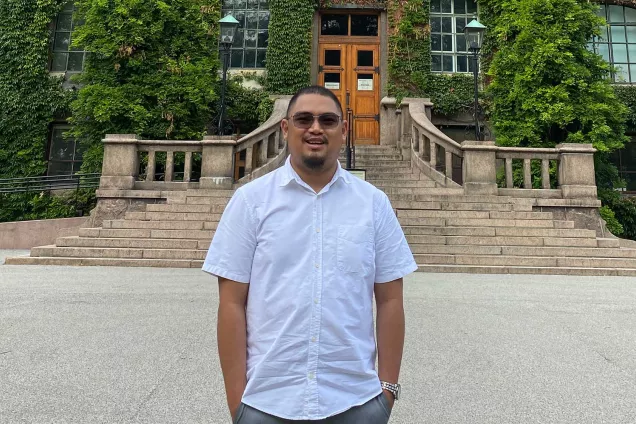What Gresa says about the Master's in Sociology of Law
Gresa from Kosovo
Hi! My name is Gresa, and I'm the student ambassador for the Master's programme in Sociology of Law. I am happy to answer any questions you might have about the programme, courses, student life, and life in Lund and Sweden via the Unibuddy Platform, where you can chat with me (see below). Please note that I cannot answer questions about the application process, scholarships, or residence permits.
About the programme and the teaching style
How did you find out about this programme and why did you choose it?
"At the time, I was actively seeking an alternative to black-letter law. I was interested in how law can impact social change. Lund was at the top of my list since it’s known for research and the Sociology of Law programme piqued my interest. However, it was only after reading through Bankar's fantastic book on Normativity in Legal Sociology (which happens to be one of the assigned books for the first course) that I made the decision. I was deeply engrossed in the material, and this particular passage left a profound impression on me: “While sociology draws inspiration from both science and the arts, neither category is its only home. Its vacillation or uncertainty between the two helps to sustain this disciplinary openness”. This book helped me understand that the programme was a perfect fit for me because I was looking for openness and creative space. Now, I consider it to be one of the most significant choices I made in my 20s."
What do you think about your programme so far? Does it live up to your expectations?
"My understanding of the sociology of law, in the beginning, was completely different from my understanding now, and the learning exceeded my expectations. One aspect that has been so rewarding is the ability to approach complex social issues within my home country from multidimensional perspectives. I arrived at this programme with many questions: What is law exactly and how to understand it in society? Do we really need legal rules and why? Does the law have the potential to induce social justice? What is the future of law and how does its future connect to the past? The courses have allowed me to explore some of these questions and raised many more! This programme is a fascinating introduction to an emerging, exciting and quite unchartered discipline. With this comes risk and uncertainty, as well as novelty and immense possibilities to experiment with theory, method, and overall research."
What is the best thing about your programme?
"The interdisciplinary nature and the readings are the best parts of the programme. I can hardly put down more of the literature that is assigned to us. Both have transformed my understanding of law in society and helped to sharpen my critical thinking."
What do you think of the teaching style at Lund?
"A close second to the content and readings, are the lecturers. Their intelligence, openness and kindness create a learning atmosphere that is inclusive, interactive and nurturing. There is no heavily felt hierarchy and lecturers exemplify their progressive attitudes by being open to bidirectional feedback and critique, which is very refreshing. Lecturers are supportive and encouraging, giving the impression that they want to see you succeed, which is very motivating."
Why should prospective students choose this programme?
"This programme is excellent for people that are looking for a deeper understanding of law, regardless of their background, whether they are lawyers or social scientists. It is an interdisciplinary programme. We read not only about sociology but also political science and legal anthropology, to name a few. The interdisciplinary approach keeps you on your toes, and teaches you to be critical of and reflexive about your own positioning and that of the law, as well as of any legal norms you may encounter in the future. In particular, it sharpens your critical thinking and your research skills, which are highly transferable and useful across multiple sectors of academia, civil society, government and even the private sector."
Have you been able to gain any practical experience during your studies so far?
"Next semester, we have the option to choose an internship. So far, I have had the opportunity to conduct fieldwork as part of an immersive practical learning environment. This immersive and challenging course was my first time conducting ethnographic field studies and I found it very rewarding. This was an elective course and there are other practical courses and experiences available."
How international is your programme and what is it like to study in that kind of environment?
"The programme is very diverse, with 12 different nationalities and a wide array of professional and educational backgrounds among our cohort. There are students from law, sociology, criminology, migration studies, anthropology, political science, human rights and so on. It makes for an exciting and engaging learning environment."
Thoughts on being an international student at Lund, spare time and tips for prospective students
What it is like to be an international student at Lund University?
"Lund is a charming student town, and life here is safe and quiet, with beautiful nature close by and access to many facilities – all a quick bike ride or reasonable walk away. It’s also close to Malmö, which is the closest big city. As an international student, the university offers numerous activities, seminars, workshops and clubs. If you are looking for extracurricular activities, the student nations always have something going on, whether it be parties or lectures. Also, if you are seeking edgier and alternative events and exhibitions, Malmö is just 15 minutes away by train. Last month, my friends and I were fortunate enough to attend Judith Butler's lecture at Malmö’s Library."
What do you do in your spare time?
"I like to explore around by taking my bike and heading in a new direction each time. There are many enchanting places to visit, including Lomma, Bjärred and Jakriborg. The road to Bjärred is my favourite, surrounded by fields and fields of green. I cycle it every few months and it’s beautiful to watch the seasons change. However, what brings me the most joy in Lund are the libraries – there are so many! It is not just the books but also how the spaces are designed in such a way to be inviting and comfortable. Sambib and Stadsbiblioteket are my favourites."
Do you have any advice for other students who are considering coming to Lund?
"Choosing Lund is a very personal decision depending on your particular needs and aspirations. However, if you do decide to come, then my advice would be to explore everything and anything. Whether it is yourself in a new environment, your discipline or the opportunities provided by the University and/or city, let your curiosity take you places both figuratively and literally."
Future plans
What are you planning to do after your studies?
"I want to continue with research. Thus, I will most likely pursue post-doctorate studies."
To what extent does your degree programme prepare you for a career in your field?
"For someone like me, who is interested in in-depth research, this programme provides an excellent opportunity to hone and expand on these skills."

"A broad mixture of academic backgrounds"
Oscar from Sweden

Meet our student ambassador Johari
Read his testimonial and chat with him via Unibuddy.
